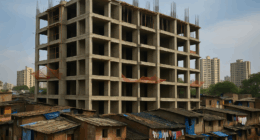By Nidhi Aggarwal
Constructing a new home or any building is a time-consuming process that necessitates all-encompassing involvement, frantic negotiations, and close interaction with numerous vendors and service providers. There are a number of steps that are involved in the process, from selecting the right location to locating the right builder to handling all of the paperwork. However, if you’re prepared and have a good team, building your new home can be a pleasant and enjoyable experience. Let’s break down the procedure that needs to be followed before constructing a house.
The pre-construction process
1. Land acquisition
It is the most important stage of building construction. Look for a building location that is best suited for building construction. It is recommended that you collect prior data before purchasing land, either by conducting online research or by seeking assistance from real estate agents or concerned consultants regarding the effective cost of the same.
2. Building Plan
The most important aspect of building construction is your building plan. It assists you in anticipating the features and functions of various stages of your construction process. Architects, civil engineers, electricians, and plumbers are essential in planning a successful building construction project. The building plan is set by architectural engineers based on the requirements of the building.
3. Budget estimation
Building construction involves a tremendous amount of material and budget. The building estimator estimates material quantity and several work items and prepares a sheet containing the construction cost. If financial resources are limited, there is a need to seek pre-approval for loans in advance, or you may end up in a cash crunch.
4. Building Permits
The house layout needs approval from the district authorities. The state and local governments enlist the statutory requirement for a residential project. Some approvals are layout approval, water, and electric connections, sewerage connection, Rainwater harvesting, etc.
Construction Stage
When the pre-construction requisites are in place, it’s time to start building! This process typically takes several months and necessitates the collaboration of many different workers. On the job site, an expert must constantly supervise the construction work. This person would be held accountable for a variety of activities as well as on-site technical problem-solving.
Post Construction stage
There are a few things to do after your new home is completed and before you move in and enjoy your new space. Apply for required documents, such as a Certificate of Occupancy, from the local building department. It certifies that your home complies with all building code requirements and is safe to live in. Get homeowners insurance to protect yourself from financial losses if your home is damaged or destroyed by fire, natural disasters, or other covered hazards.
Nidhi Aggarwal, is Founder, Space Mantra, views expressed in this article solely belongs to the author and do not represent the views that of SquareFeatIndia
Also Read:Is it the right time to invest in an under construction property?









